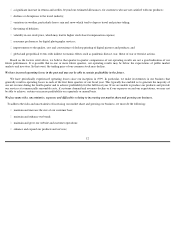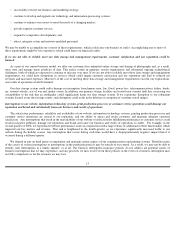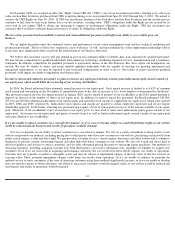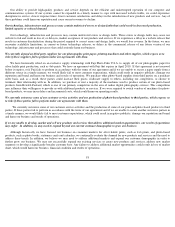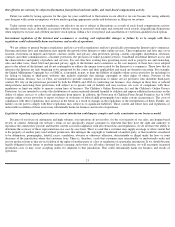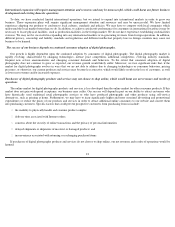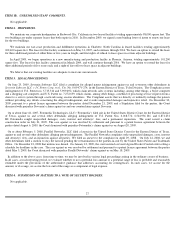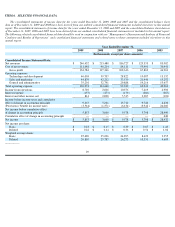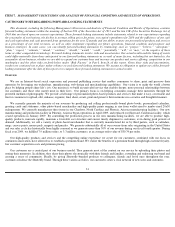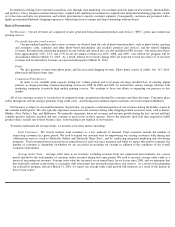Shutterfly 2010 Annual Report Download - page 24
Download and view the complete annual report
Please find page 24 of the 2010 Shutterfly annual report below. You can navigate through the pages in the report by either clicking on the pages listed below, or by using the keyword search tool below to find specific information within the annual report.
Our practice of offering free products and services could be subject to judicial or regulatory challenge.
We regularly offer free products and free shipping as an inducement for customers to try our products. Although we believe that we
conspicuously and clearly communicate all details and conditions of these offers —
for example, that customers are required to pay shipping,
handling and/or processing charges to take advantage of the free product offer —
we may be subject to claims from individuals or governmental
regulators that our free offers are misleading or do not comply with applicable legislation. These claims may be expensive to defend and could
divert management’
s time and attention. If we become subject to such claims in the future, or are required or elect to curtail or eliminate our use
of free offers, our results of operations may be harmed.
Any failure by us to protect the confidential information of our customers and networks against security breaches and the risks associated
with credit card fraud could damage our reputation and brand and substantially harm our business and results of operations.
A significant prerequisite to online commerce and communications is the secure transmission of confidential information over public
networks. Our failure to prevent security breaches could damage our reputation and brand and substantially harm our business and results of
operations. For example, a majority of our sales are billed to our customers’ credit card accounts directly, orders are shipped to a customer’
s
address, and customers log on using their e-
mail address. We rely on encryption and authentication technology licensed from third parties to
effect the secure transmission of confidential information, including credit card numbers. Advances in computer capabilities, new discoveries in
the field of cryptography or other developments may result in a compromise or breach of the technology used by us to protect customer
transaction data. In addition, any party who is able to illicitly obtain a user’s password could access the user’
s transaction data, personal
information or stored images. Any compromise of our security could damage our reputation and brand and expose us to a risk of loss or litigation
and possible liability, which would substantially harm our business and results of operations. In addition, anyone who is able to circumvent our
security measures could misappropriate proprietary information or cause interruptions in our operations. We may need to devote significant
resources to protect against security breaches or to address problems caused by breaches.
In addition, contractors that we hire as well as other employees have access to confidential information, including credit card data.
Although we take steps to limit this access, this data could be compromised by these contractors or other employee personnel. U
nder current
credit card practices, we are liable for fraudulent credit card transactions because we do not obtain a cardholder’
s signature. We do not currently
carry insurance against this risk. To date, we have experienced minimal losses from credit card fraud, but we continue to face the risk of
significant losses from this type of fraud. Our failure to adequately control fraudulent credit card transactions and use of confidential information
could damage our reputation and brand and substantially harm our business and results of operations.
The inability to acquire or maintain domain names for our website could substantially harm our business and results of operations.
We currently are the registrant of the Internet domain name for our website, Shutterfly.com, as well as various related domain names.
Domain names generally are regulated by Internet regulatory bodies and are controlled also by trademark and other related laws. The regulations
governing domain names could change in ways that block or interfere with our ability to use relevant domains. Also, we might not be able to
prevent third parties from registering or retaining domain names that interfere with our consumer communications, or infringe or otherwise
decrease the value of our trademarks and other proprietary rights. Regulatory bodies also may establish additional generic or country-code top-
level domains or modify the requirements for holding domain names. As a result, we might not be able to acquire or maintain the domain names
that utilize the name Shutterfly in all of the countries in which we currently or intend to conduct business. This could substantially harm our
business and results of operations.
Changes in regulations or user concerns regarding privacy and protection of user data could harm our business.
Federal, state and international laws and regulations may govern the collection, use, sharing and security of data that we receive from our
customers. In addition, we have and post on our website our own privacy policies and practices concerning the collection, use and disclosure of
customer data. Any failure, or perceived failure, by us to comply with our posted privacy policies or with any data-
related consent orders,
Federal Trade Commission requirements or other federal, state or international privacy-
related laws and regulations could result in proceedings
or actions against us by governmental entities or others, which could potentially harm our business. Further, failure or perceived failure to
comply with our policies or applicable requirements related to the collection, use or security of personal information or other privacy-
related
matters could damage our reputation and result in a loss of customers.
22


